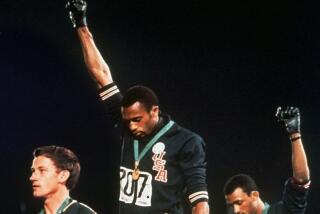Resisting the tug of a fast life
- Share via
“People are born and married, and live and die in the midst of an uproar so frantic that you would think they would go mad of it.” It was only 1907 when the American man of letters William Dean Howells made this heartfelt observation, which shows that even in the days before jet travel, freeways, high-speed chases, amphetamines, rock music, cellphones, the Internet and multi-tasking, people were already hurrying themselves to death. In another of the many aptly chosen quotes in Carl Honore’s book “In Praise of Slowness,” we hear a similar sentiment expressed by 19th century philosopher Soren Kierkegaard: “Most men pursue pleasure with such breathless haste that they hurry past it.”
Where is everyone going in such a hurry? Why do some drivers race through red lights and crazily swoop across freeway lanes, speeding up to prevent anyone else from getting in front of them? Do they really believe it’s all that important to get where they’re going a few minutes earlier, especially when their recklessness can cause an accident that might delay them forever?
And who are all those harried souls clutching their cellphones to their ears, whether they’re driving, walking, shopping or taking their children to the park? One can’t help thinking their motto should be “Life is elsewhere,” for they seem incapable of fully giving themselves over to whatever activity they’re supposedly engaged in.
A Canadian journalist, Honore has noticed the growing propensity for speed at any price: Indeed, he recognizes it in himself. Over the last 15 years, he’s seen how he’s changed from the laid-back, mellow sightseer he used to be -- unfazed by delays, happy to enjoy the moment -- into the harried, impatient, bad-tempered traveler he now is, dashing “through the departure lounge, silently cursing anyone who crosses [his] path at a slower rate.”
“[T]he time has come,” Honore believes, “to challenge our obsession with doing everything more quickly.”
As is evident from the book’s title, Honore has read “Slowness,” that engaging paean to the leisurely pace of a bygone, pre-Industrial era by Czech novelist Milan Kundera, and he thinks we all could take a leaf from that book. Honore makes it clear he’s not against speed and efficiency when necessary and appropriate: He has no wish to give up his access to the Internet or replace jet travel with the horse and buggy. But he rightly identifies our obsession with speed as dangerous, addictive and perhaps even “a kind of idolatry,” a product of the Darwinian dog-eat-dog ethos that has become so ubiquitous over the last few decades:
“The case against speed starts with the economy. Modern capitalism generates extraordinary wealth, but at the cost of devouring natural resources faster than Mother Nature can replace them.... Then there is the human cost of turbo-capitalism. These days, we exist to serve the economy, rather than the other way around. Long hours on the job are making us unproductive, error-prone, unhappy and ill.”
Honore devotes the bulk of his book to showing us the ways in which people all over the world are reacting to the rat-race mentality. He introduces us to what he identifies as a worldwide “slow” movement, which encompasses a surprising number of organizations dedicated to decreasing life’s pressures and increasing its pleasures, from the Society for the Deceleration of Time, based in Klagenfurt, Austria, to Japan’s amusingly named Sloth Club.
In Italy, the Citta Slow (Slow Cities) movement encourages cities to reduce noise, pollution and traffic; increase green spaces; foster local farmers and artisans; and adopt other measures designed to decrease the stress of urban life, making it more leisurely and satisfying. Carlo Petrini’s Slow Food movement, boasting 78,000 members in more than 50 countries, is predicated on the idea that wholesome meals incorporating local artisanal specialties and agricultural products of sustainable farming go hand in hand with the larger aim of protecting the environment.
Honore also investigates other slow approaches to life, including meditation, handicrafts, reading, Tantric sex, alternative medicine, yoga, Pilates and other relaxing forms of recreation. He has an interesting chapter about efforts being made in various countries to decrease pressure and stress on the job, including the recent French experiment of limiting the number of hours that people are allowed to work. Elsewhere, he focuses on how best to educate our children, and he finds that, despite the widespread tendency to over-schedule the poor things to within an inch of their lives -- with soccer, karate, drama club, extra tutoring, and play dates -- some parents are adopting a less frenetic approach that seems not only to take the pressure off kids but also to help them do better at their studies.
On any given day, more people die in traffic accidents worldwide than were killed in the terrorist attacks on the World Trade Center, another of the many good reasons Honore gives us for heeding the words of Simon and Garfunkel’s “59th Street Bridge Song”: “Slow down, you move too fast.” His book makes a persuasive case against mindless speed and offers an intriguing array of concrete suggestions about ways “to make the moment last.” *
More to Read
Sign up for our Book Club newsletter
Get the latest news, events and more from the Los Angeles Times Book Club, and help us get L.A. reading and talking.
You may occasionally receive promotional content from the Los Angeles Times.










